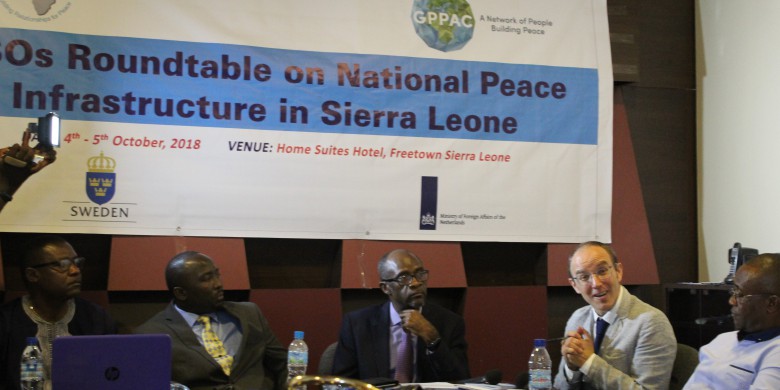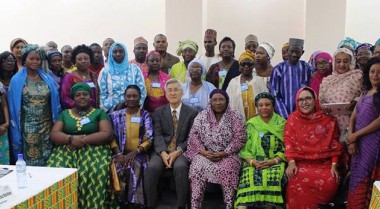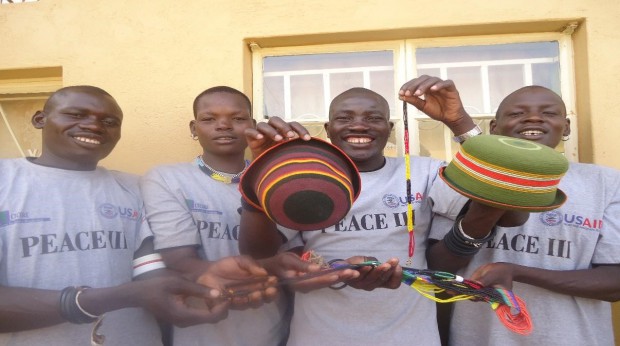
Building Sustainable Peace in Sierra Leone
GPPAC brought together civil society actors from across Sierra Leone to engage in the establishment of an independent Peace and National Cohesion Commission from 4-5 of October, 2018 in Freetown. This Infrastructures for Peace (I4P) roundtable organised jointly with its key member, the West Africa Network for Peacebuilding (WANEP), came up with a series of recommendations and follow-up steps. These steps will guide the continued involvement of civil society actors in the formalisation of a commission as a social mechanism to sustain peace in Sierra Leone. A first example is the upcoming Government-UNDP led national dialogue conference planned for November 2018.

Sierra Leone has been scarred by a decade long civil war that ravaged the country between 1991 and 2002 causing over 50.000 casualties. A decade later, an ebola epidemic broke out, taking roughly 4.000 lives and fragelising the social cohesion at national and regional levels. Due to these disrupting events, it has been extremely complex to engage in meaningful peacebuilding and state building processes by local, national or international actors. Various approaches and strategies have been set in place, but a sustained attention towards peace at all levels has been lacking.
The new Government (elected in April 2018) has set sustainable peace and development as central issues to achieve a just, inclusive and peaceful society, as described in SDG 16. Nabeela Tunis, Minister of Planning and Economic Development, believes that SDG 16 plays a central role both at a global and at a national level, calling it "the mother of all goals". During a recent forum, she called for a focus on key elements such as inclusion and participation in order to achieve national cohesion. The new Government chose to continue its role as a co-chair of the task force on access to justice together with the Netherlands and Argentina.
Yet, next to a formal judicial system, it is important to establish infrastructures for peace as a "dynamic networking of skills, capacities, resources, tools and institutions that help build constructive social and political relationships and enhance sustainable resilience of societies against relapse into violence". In line with these commitments, Sierra Leone's President Julius Maada Bio recently announced plans to set up a national infrastructure for peace, an independent National Commission on Peace and Cohesion to help address ethnic and regional divides along political lines across the country as well as to strengthen peace and national inclusion. In this article by the Sierra Leone Telegraph, the importance on having this independent commission is highlighted.
The Infrastructures for Peace (I4P) Roundtable
Seizing the call by the president to establish an independent Peace and national cohesion commission, GPPAC and WANEP organised a roundtable on I4P. The roundtable allowed for discussions and strategizing among 25 CSO's from Sierra Leone together with GPPAC members from across the globe. A representative from the Ghana National Peace Council (NPC) shared their experience in setting up their nation wide infrastructures that helped facilitate relatively peaceful political transitions in Ghana. The NPC also functions as a bridge between local communities, districts and the Government highlighting issues to be addressed and facilitating timely interventions. Limitations the council faced and that should inform strategies in Sierra Leone include the need to reach out to the most local levels and build on the existing capacities and systems that support peace. This also needs to be adequately resourced, primarily by the Government, and only secondarily by potential outside actors.
Taking into account the various inputs and experiences, Sierra Leonean CSOs developed a joint framework for engaging into the process of setting up such a commission. They agreed on the need for an inclusive and independent peace infrastructure to enhance national cohesion and development in Sierra Leone. The envisaged mandates of a peace commission included among others the promotion of a culture of peace, the support for the prevention and management of conflicts and enhancing traditional conflict resolution mechanisms. The need to make the commission as independent from the current political climate as possible was also stressed and translated into recommendations for its composition and sustainability. It was unanimously agreed that PAACET would lead the CSOs engagements to popularise the outcome of the meeting and link up with existing structures working on social cohesion programs and the peace commission. With a conference on the establishment of a Peace Commission planned by the Government of Sierra Leone in November 2018, the roundtable came in a timely manner to ensure joint exchanges and engagements from civil society to create sustainable peace in the country.

